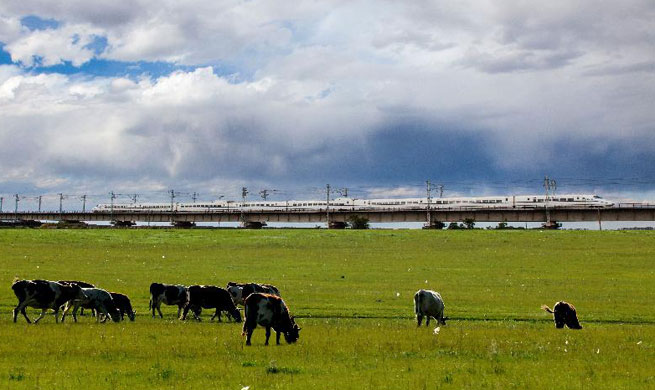NAIROBI, July 27 (Xinhua) -- International elephant research organization, Save The Elephants, said Thursday an ambitious new report identifying some of Kenya's most important wildlife migratory corridors will help close the gap between conservation and urban development.
Save The Elephants' Head of Monitoring and one of the co-authors of the report, Dr Ben Okita said Kenya is renowned for its wildlife, which is a key economic asset, yet wildlife populations including those of elephants have declined dramatically over the last few decades.
"This report recognizes the importance of reducing and reversing this trend by restoring connectivity to our environment, not just for the wildlife but for the people of Kenya too," Okita said in a statement issued on Wednesday evening.
He said the report, which was launched in Nairobi by Kenyan government on Wednesday, will help protect Kenya's future by setting a framework for the country to undertake landscape planning while conserving natural ecosystems.
"This in turn will ensure the country's valuable natural heritage survives as Kenya's population and infrastructure continues to grow," said Okita.
Wildlife migratory corridors will be crucial in connecting core habitats for Kenya's wildlife and ensuring the long-term survival of many species.
"As our landscape becomes increasingly more human-dominated, securing wildlife migratory routes and corridors is critical to sustaining ecological integrity as well as developing a tolerant relationship between man and wildlife," Okita said.
Over the years poaching, rangeland degradation, human-wildlife conflict and climate change have all begun to threaten the nation's wildlife populations, and urgent action is needed to stem the decline.
The wildlife migratory corridors report recognizes the threats currently facing Kenya's wildlife and as such outlines the importance of connectivity, identifies key wildlife corridors and dispersal areas and suggests priority conservation actions to protect the country's fragile natural heritage.
Save The Elephants' founder Iain Douglas-Hamilton said the wildlife corridors and dispersal areas report clearly identifies many of the important wildlife corridors in Kenya, and is a significant step forward in closing the gap between conservation and development in the country.
"We are proud to have worked alongside key wildlife partners to start forging a pathway towards a modern Kenya whose rich biodiversity remains intact," Douglas-Hamilton said.
The report attributes the decline in wildlife species to changes in government land policies and rapid population growth which discourages pastoralism and promotes privatization of land tenure, leading to land sub-division.
It says that agricultural development and settlement policies that promote farming in rangelands exacerbate the destruction of habitats and exclusion of wildlife.
"All our contributions to urban development have been motivated by our core mission of 'securing a future for elephants'," said Frank Pope, Save The Elephants' CEO.
"By doing this groundwork we, along with other key wildlife partners, are helping to put Kenya at the forefront of developing solutions to Africa's conservation challenges."

















